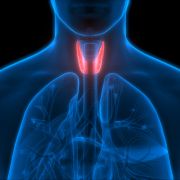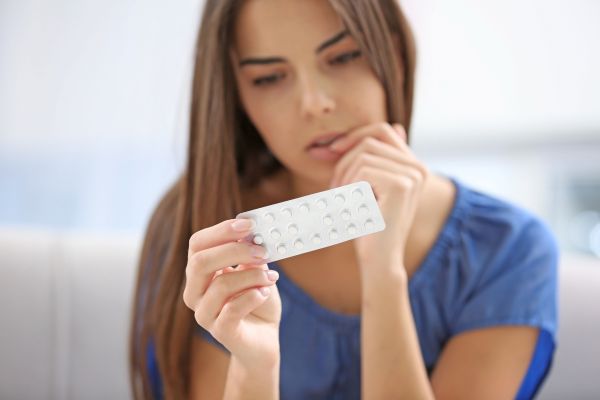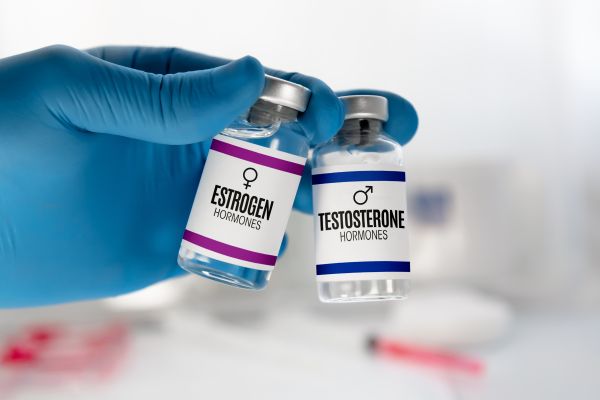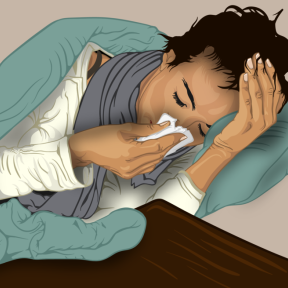
Hormones
Hormones are a class of signaling molecules that exist in all multi-cell organisms and, in humans, include commonly-known examples like melatonin, testosterone, and cortisol. They influence the health and functioning of the body and brain in a wide variety of ways; on a psychological level, they affect mood, how we behave, who we’re attracted to (or not), and more.
Contents

Hormones are molecular substances produced by multicellular organisms that allow different parts of the body—including organs, tissue, and the brain—to signal to and communicate with one another. Broadly, via this signaling, hormones help to regulate much of the organism’s physiology and behavior—including, in humans, sleep, digestion, sexual function, stress, and mood. Hormones are generally made up of amino acids, proteins, fatty acids, or can be classified as steroids.
There are dozens of hormones currently known and studied. Those that play a key role in psychological and behavioral functions include:
- Adrenaline: A hormone and neurotransmitter secreted primarily by the adrenal glands (near the kidneys) and some neurons in the brain, typically during stressful, exciting, or highly emotional situations. Also known as epinephrine, adrenaline increases heart rate and blood flow to the brain and muscles, allowing the body to react quickly and, if necessary, engage in fight-or-flight.
- Cortisol: A hormone produced by the adrenal gland that regulates key physical functions such as balancing blood sugar and dampening inflammation; it also helps the body to cope with stress. Cortisol is released regularly throughout the day, peaking early in the morning and dipping overnight. When faced with a stressful situation, the body releases heightened amounts of cortisol to prevent inflammation and increase glucose reserves in the blood; over time, consistently high levels of cortisol can lead to negative physical and emotional effects, such as worsened immunity.
- Dopamine: A neurotransmitter and hormone released by the brain during rewarding activities such as eating, sex, and exercise. Known as a “feel-good” hormone, dopamine contributes to feelings of pleasure and motivates humans (and other animals) to seek out rewarding activities. It also plays key roles in learning, attention, and emotion.
- Estrogen: A sex hormone that, while present in both sexes, is largely responsible for female sexual development and functioning. Primarily produced in the ovaries, estrogen helps to regulate menstruation, vaginal functioning, and libido (in both sexes). It’s also vital to brain health, playing a role in emotional regulation, mood disorders, and memory, particularly as age increases and, in women, menopause starts.
- Ghrelin: A hormone produced primarily by the gastrointestinal tract—most notably in the stomach—that helps to regulate appetite. When ghrelin is released, appetite increases. Once the body signals that it’s full, ghrelin production slows down; this, along with the increase in the hormone leptin, motivates the person to stop eating. Ghrelin is typically regulated by the body’s circadian rhythm, the timing of the last meal, and blood sugar levels; however, it can be disrupted by factors such as stress and poor sleep, which can lead to dysregulated appetite.
- Growth Hormone: A hormone that stimulates growth, cell reproduction, and cell repair. Also known as human growth hormone, or HGH, it is produced by the pituitary gland. Though production continues throughout the lifetime, it ramps up during puberty to increase height, boost muscle mass, and promote bone growth and strengthening. HGH also regulates immune functioning, rejuvenates tissues and organs, and is an essential component of collagen production, which boosts skin and hair health.
- Insulin: A hormone produced in the pancreas that regulates metabolism and blood sugar. Insulin is released as the body breaks down carbohydrates into glucose, allowing glucose to enter cells where it is used as energy, and carrying excess glucose to the liver. Those who make very little insulin—or who become resistant to its effects, often due to obesity, metabolic syndrome, or genetics—can develop diabetes.
- Leptin: A hormone released by adipose tissue (also known as fat) that works in concert with ghrelin to regulate appetite. When ghrelin is released, hunger increases; leptin is released after food is consumed to signal fullness and discourage additional intake. The body becoming increasingly resistant to leptin’s effects over time is a risk factor for obesity; a condition known as leptin receptor deficiency can also promote obesity (and psychological distress) by triggering near-constant hunger.
- Melatonin: A hormone released primarily by the brain’s pineal gland that regulates the body’s sleep-wake cycle. Melatonin levels rise and fall naturally throughout the day, peaking in the evening (to promote feelings of sleepiness before bedtime) and dipping to their lowest levels in the morning. While the melatonin cycle is strongly influenced by the 24-hour cycle of day and night, it can also be affected by food, physical activity, genetics, and travel.
- Norepinephrine: A hormone and neurotransmitter released by the brain and the adrenal glands. Among other functions, norepinephrine is critical for the fight-or-flight response. In the brain, it helps regulate attention, alertness, vigilance, and anxiety; in the body, increased levels of norepinephrine speed heart rate, breathing, and blood pressure. Like adrenaline, norepinephrine production increases during stressful or exciting situations.
- Oxytocin: A hormone and neurotransmitter produced by the hypothalamus and released by the pituitary gland. Known colloquially as the “love hormone,” oxytocin plays a key role in socializing, romantic relationships, and parent-child bonding, as it is released during group activities, physical contact, sexual stimulation, childbirth, and breastfeeding. Oxytocin can also, however, trigger aggression toward members of the ”out-group.”
- Progesterone: A sex hormone primarily implicated in the female reproductive cycle. Though it’s also necessary for male sexual function (as it aids the production of testosterone), progesterone’s main roles are to regulate the menstrual cycle, the development of female sex characteristics, such as breasts, and pregnancy. In women, progesterone is produced in the ovaries and works in concert with estrogen.
- Testosterone: A sex hormone that is the main driver of male sexual development and libido; it also plays a smaller role in female sexual functioning. Testosterone is often thought of as a driver of aggression, and though it does play a role in aggression to some degree, it also affects language skills, cognitive functioning, growth, and physical health. Testosterone is produced in the testicles of males and in the ovaries of females.
- Vasopressin: A hormone produced by the hypothalamus and released by the pituitary gland that has several physiological functions, including the regulation of blood pressure and circulatory function. Recent research (most notably in animals) suggests that vasopressin may also play a role in disorders like autism, as well as work in concert with oxytocin to promote social bonding.
The endocrine system is a network of glands and other structures throughout the body that synthesize and secrete hormones. Endocrine glands release hormones into the circulatory system, where they travel via the bloodstream to different organs to regulate metabolism, growth, mood, and other key aspects of mental and physical health. Primary structures in the endocrine system include the adrenal gland, the pineal gland, the pituitary gland, the ovaries and testes, the pancreas, and the hypothalamus.
Hormones’ main function is to communicate between organs and tissues throughout the body to regulate physiology and behavior. This can include regulating physical functions such as respiration, digestion, lactation, or growth; hormones also have a hand in behavioral activities such as sleep, mood, movement, and sexual function.
There are currently thought to be more than 70 hormones in the human body.
Hormones are signaling molecules that are secreted by the endocrine glands and that facilitate communication between various parts of the body—including tissues, muscles, nerve cells, and organs. Neurotransmitters are signaling molecules that transmit messages specifically from nerve cells to their targets, including other nerve cells, muscle cells, or glands.
Yes, certain chemicals can be classified as both hormones and neurotransmitters. These include dopamine, oxytocin, and norepinephrine, among others.

Hormones are silent drivers of behavior and personality, and their molecular fingerprints are on countless day-to-day activities and occurrences, ranging from attraction to appetite. Decades of biological and psychological research have found that certain hormones are associated with specific traits, emotions, and behaviors, but in reality, the human endocrine system is so complex that the same chemical may behave radically differently from person to person. Hormones affect people in different ways throughout their lives, and hormone levels can spike dramatically at physical or emotional transitions. New parents are slammed with a rush of hormones, for instance, as are rookie players on sports teams and tweens entering middle school.
Hormones affect behavior in myriad, complex ways that are often dependent on the situation. Testosterone, for example, has been linked to aggressive or antisocial behavior and competitiveness in situations that call for it. On the other hand, in non-competitive situations, testosterone has been associated with protectiveness, generosity, and prosocial behavior.
Hormones have a hand in aggression, dominance, risk-aversion, warmth, generosity, and other elements that determine how someone behaves, thinks, and feels. Hormones’ connection to personality models such as the Big 5 is less clear, though some studies have found, for instance, that higher levels of testosterone and dopamine are both linked to greater extraversion.
Surges in hormones like oxytocin and dopamine can drive feelings of happiness, contentment, or excitement, while drops in hormones like estrogen and progesterone may trigger negatively charged mood swings. Dips in testosterone may correlate with low mood; excessive testosterone may trigger rage or aggression.
Cortisol is a key player in the sleep-wake cycle, peaking in the morning to promote wakefulness before naturally declining throughout the day to induce sleepiness. Stress stimulates the hypothalamic-pituitary-adrenal (HPA) axis, which functions as part of both the nervous and the endocrine system, to release excess amounts of cortisol. Such overactivation of the HPA axis can heighten physical and mental arousal at night, disrupting sleep. While one night of poor sleep is unlikely to cause serious harm, frequent exposure to stress and excess cortisol can lead to serious health problems over time. (Poor sleep can itself increase levels of cortisol, which may perpetuate a cycle of heightened stress and poor sleep.)
Though it’s often easier said than done, reducing one’s day-to-day stress can significantly lower cortisol levels. In addition to reducing the frequency of encountering stressful situations (by, for example, changing one’s job or ending an unhappy relationship), widely-used stress reduction strategies include regular exercise, eating a healthy diet, meditating, practicing deep-breathing, or tackling stress-inducing thought patterns in cognitive-behavioral therapy.
The hormone melatonin is central to sleep. The body produces melatonin naturally throughout the day in correspondence to the 24-hour day-night cycle, peaking in the evening when it’s time to go to bed and reaching their lowest levels in the morning. Heightened levels of melatonin in the bloodstream increase feelings of sleepiness; thus, some people may take melatonin supplements to induce sleep. However, early morning light exposure, regular exercise, and a diet rich in fruits and vegetables can also help the body regulate its melatonin cycle and induce sleep at an ideal time.
The human drive to eat (and to stop when satiated) is largely controlled by hormones. When the body releases the hormone ghrelin, for instance, appetite increases, while the release of leptin (typically after a meal is consumed) dampens appetite. The release of ghrelin and leptin fluctuates throughout the day and is influenced by the body’s circadian rhythm, the timing of the last meal, and how much food is eaten. However, poor sleep, stress, or other physiological factors may lead to increases or decreases in hormone amounts that can disrupt appetite.

When laypeople think of hormones, the sex hormones—most notably testosterone and estrogen—are often the first ones that come to mind, for unsurprising reasons. The sex hormones are critical for sexual function, libido, and reproduction—areas of great interest to many adults—and they also have a hand in romantic bonds and long-term relationships. Despite their renown, however, the sex hormones are more complex than is widely understood. And while they certainly influence sexual behavior, they are not the sole driver of an individual’s sexual and romantic satisfaction.
Past studies have found that during ovulation (when levels of hormones like estrogen increase), heterosexual women are more attracted to men with “masculine” faces (strong jaw, heavy brow, etc). However, newer and more rigorously-designed research finds little correlation between ovulation and women’s mate preferences, suggesting that the role of hormones in women’s sexual taste may be overstated.
Research has found that heterosexual women do appear to be more interested in sex during ovulation—both with a long-term partner and with men outside of the pair. The evolutionary reasons for this make sense, as desiring sex during the fertile period of ovulation would make them more likely to conceive.
Testosterone may increase heterosexual men’s preference for women with more feminine faces, research finds—at least for short-term relationships. Some evidence suggests that men with increased levels of testosterone are less attracted to feminine women for long-term relationships—perhaps, the researchers suggest, because women with more feminine facial features have been found in past studies to be perceived as more promiscuous.
Hormones play key roles in desire, love, and attachment. Early attraction, for instance, is driven by testosterone or estrogen; once a bond has formed, dopamine (associated with reward) encourages someone to spend more time with their new partner. Oxytocin creates a desire to nurture one’s partner, laying the groundwork for a more lasting commitment.
Yes. In women, estrogen (which peaks during her most fertile time of the month) correlates with increased sexual desire; higher progesterone, on the other hand, can decrease it. In men, testosterone fuels sex drive, and low levels can result in sexual dysfunction and muted desire.

Since hormones serve such a wide range of functions in the mind and body, they can trigger unpleasant physical or psychological symptoms—or even medical conditions—when they fall out of balance. Hormonal imbalances or endocrine disorders are not always easy to identify, and may require medical tests to properly diagnose. But while endocrine disorders may necessitate formal medical treatment, certain hormonal imbalances may be treated with lifestyle changes or by addressing symptoms directly. In some cases, however, supplemental hormones may be given to correct imbalances.
Ultimately, hormones—even the same hormone—can serve a wide range of functions, from slowing growth to stimulating it, and from activating the immune system to inhibiting it. There is little in the human body that hormones don't play a role in; as a result, when hormone levels are thrown off balance, the effects can appear in a variety of ways.
A hormonal imbalance is said to occur when there is too much or too little of a particular hormone in the bloodstream. It may trigger negative physical or psychological symptoms, such as mood instability or depression, weight gain or weight loss, disrupted menstrual cycles, frequent fatigue, muscle pain, or a wide range of other symptoms.
Individuals who suspect a hormonal imbalance should consult with a medical professional to measure hormone levels and test for other possible causes of negative symptoms. If a hormonal imbalance is identified, treatment may include hormonal supplement therapy or hormonal-blocking medications (such as anti-androgen medications). Lifestyle changes, such as losing weight or eating a healthier diet, may also help the body better regulate its hormones.
Common endocrine disorders include hypo- and hyperthyroidism (where the thyroid produces too little or too much thyroid hormone), gigantism (in which the pituitary gland produces excessive amounts of growth hormone), and polycystic ovary syndrome, or PCOS (in which the female body produces excess amounts of androgens).
Hormones are used to treat a wide range of medical conditions. Common targets of hormone therapy include the symptoms of menopause, polycystic ovary syndrome, low testosterone, diabetes, or hypothyroidism. Hormones can also be administered as part of gender-affirming therapy for transgender individuals.
Hormonal therapy can sometimes help with symptoms of depression, but it’s rarely used as a first-line treatment. However, hormonal replacement therapy (HRT) in menopausal women, along with testosterone therapy in men with low testosterone, have both been shown to improve mood in some cases. Perimenopausal mood swings, for instance, may be responsive to HRT.
Elevated cortisol levels—typically resulting from chronic stress—have been shown to dampen immune function, reduce bone density, spur weight gain, and increase the risk of heart disease. Increased levels of the stress hormone over long periods of time are also associated with a shortened life expectancy.
Children exposed to chronic stress—leading to excess levels of the stress hormones epinephrine (adrenaline), norepinephrine, and cortisol—may experience stunted growth, a condition known as psychosocial short stature. Stress hormones inhibit key bodily functions like digestion and cell repair (in order to direct energy to the fight-or-flight response), as well as the production of growth hormone. Over time, this can lead to reduced bone density, muscle mass, and height. Evidence does suggest, however, that children who leave abusive or stressful environments are able to “catch up” and regain much of their lost height.
Excessive hunger may be hormonal. Individuals who have defects in the way their body produces or responds to leptin, for instance, may find that their appetite is larger than that needed to sustain their body weight, which may lead to obesity and/or psychological distress. In rare cases, doctors may administer leptin to help such individuals curb their appetite.

Testosterone is what makes men so manly. Oxytocin is the “love hormone.” And cortisol is responsible for crazy amounts of stress, right?
Not exactly. In fact, most of what the average person understands about the role of hormones is a heavily simplified version of how they actually function in the human body. In reality, testosterone is necessary for both males and females. Oxytocin can stimulate pleasant feelings and boost close bonds, but it has also been linked to feelings of social prejudice. And cortisol helps the body deal with stressful situations; it’s only when there’s too much of it present for too long that it starts to have negative effects.
Oxytocin is produced in the brain during sex, childbirth, breastfeeding, and other activities that promote close bonds between romantic partners, parents and children, or tight social groups—hence it’s reputation as a “love hormone.” But it can also foster negative behavior. In human and animal studies, stimulating oxytocin receptors in the brain was shown to trigger aggression, an “us-versus-them” mentality, social avoidance, or dishonesty—all directed toward out-group members. Such behavior is likely to prioritize the well-being of the “in-group,” thus further fostering a family or tribe’s social bonds.
Yes. Despite testosterone’s better-known association with male behavior and development, testosterone is actually important for both sexes—particularly when it comes to sexuality. Studies show that women with diminished testosterone (produced in the ovaries and the adrenal gland) show markedly decreased libido; in some cases, treating such women with testosterone may help overcome a low sex drive.
Both men and women have estrogen, and in men, normal amounts of estrogen work in concert with testosterone to produce sperm and bolster libido. However, excess estrogen in men can lead to negative side effects, including breast growth, erectile dysfunction, infertility, and reduced sex drive. Men who suspect that they have high estrogen levels should consult with a doctor.
Cortisol does not cause stress; rather, it is released by the body in response to stressful situations. However, excess levels of cortisol, particularly over long periods of time, may lead to negative physiological and behavioral effects—such as a weakened immune system or heightened anxiety—that could make someone more vulnerable to stress later on.
The theory of “adrenal fatigue” posits that long-term or repeated stress can “burn out” the body’s adrenal glands, rendering them unable to produce the hormones needed to respond to new stressors. Symptoms of so-called adrenal fatigue include frequent tiredness, body aches, weight loss, and “brain fog.” However, while endocrinologists do accept that the adrenal glands can produce insufficient amounts of key hormones (often as a result of underlying disease), there is no scientific basis for the idea that repeated exposure to stress causes them to fail.
“Adrenal fatigue” is not an accepted medical diagnosis, and some remedies that are targeted at treating adrenal fatigue may be dangerous. Symptoms of fatigue, mental slowness, muscle weakness, or hair loss may be caused by many other accepted—and treatable—diagnoses, such as anemia, autoimmune disorders, or sleep apnea, among others.
Some people—often called “sensation seekers” or “thrillseekers”—do desire and actively seek out situations that give them a rush of adrenaline, like extreme sports or dangerous jobs, and may feel unhappy or agitated when they are unable to partake in adrenaline-boosting activities. Though such people are often called “adrenaline junkies,” the DSM does not currently recognize adrenaline addiction as a formal diagnosis. However, evidence does suggest that sensation-seekers may be more vulnerable to other addictions, such as substance abuse.
There have been documented cases of so-called “hysterical strength,” in which someone in the grips of intense stress is able to display extreme strength or fearlessness. Someone whose child is trapped under a car, for example, may find themselves temporarily able to lift the heavy vehicle in order to free their loved one. Though scientific understanding of hysterical strength is limited (as it’s not possible to recreate such life-or-death situations in laboratory environments), researchers suspect that extremely high levels of adrenaline and norepinephrine direct elevated levels of oxygen and blood to the muscles, allowing them to perform feats that would, under normal conditions, be impossible. However, a moderate adrenaline rush—such as one that occurs when riding a rollercoaster—will not result in superhuman strength.














